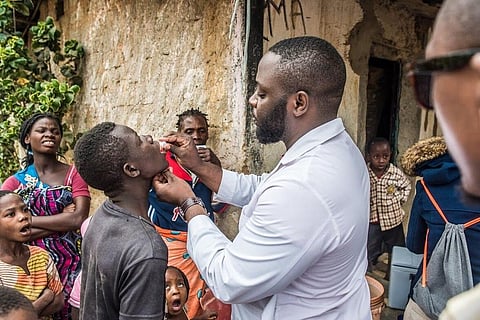

In February 2023, over 389,300 people — 226,000 in Madagascar and over 163,300 in Mozambique — were affected by heavy rainfall and floods led by Tropical Storm Freddy. The extreme climate events have triggered cholera outbreaks in the two countries that are among the 12 African nations currently reporting the a surge in the outbreak of the waterborne disease.
While the weekly cholera cases in affected African countries have declined, the floods due to seasonal rains and tropical cyclones in southern Africa risk fuelling the spread of cholera in the region, alerted Dr Matshidiso Moeti, World Health Organization’s regional director for Africa, in a statement issued March 2, 2023.
“The ongoing cholera outbreaks in Africa are being exacerbated by extreme climatic events and conflicts that have increased vulnerabilities, as people are forced to flee their homes and grapple with precarious living conditions,” she said.
In Mozambique, prior to the current increase in cases, there were cholera outbreaks in eight districts in three provinces during the first half of 2022. But the current outbreak here covers a wider geographic area and has a higher case fatality rate (CFR) than the previous one in 2022.
As of February 19, 2023, a cumulative total of 5,237 suspected cases and 37 deaths (CFR-0.7 per cent) have been reported in 29 districts from six provinces. These provinces are the flood-prone Sofala, Gaza, Niassa, Tete, Manica and Zambezia
A graph showing cholera cases in Mozambique from September 14, 2022, to February 19, 2023. (Note- 14 cases from Zambezia district are not indicated)
As the rainy season continues, it is anticipated that more districts will be affected. With the current outbreak, cholera has invaded new regions, especially the Niassa province, which had not reported any cases in over five years.
Many health professionals here lack the experience and the capacity to respond to cholera outbreaks.
Besides the heavy rainfall, weak surveillance with late reporting, inadequate access to safe drinking water, poor sanitation and hygiene practices, a weak health care system and an exhausted workforce responding to multiple emergencies pose a threat to the continued progression of the preventable waterborne disease.
Just half of Mozambicans have access to improved water supply and just one in five use improved sanitation facilities, according to the United Nations Office for the Coordination of Humanitarian Affairs.
In Madagascar, too, the floods led by two cyclones during the first two months of 2023 have been behind the upsurge in malaria cases. It increased the risk of cholera outbreaks in the country, noted the WHO in a statement
Between 2015 and 2021, the incidence of malaria cases increased by over 40 per cent in Madagascar, according to the WHO’s World Malaria Report, 2022.
As of June 5, 2022, Madagascar reported 543,994 cases of malaria and 68 deaths (CFR 0.01%), according to the weekly bulletin of the WHO for the period July 6- July 10, 2022
These incidences are associated with the five storms and tropical cyclones — Ana, Batsirai, Dumako, Emnati, and Gombo — that hit Madagascar between January and March 2022.
With floods led by these events, the risk of an increased malaria prevalence was very high, said WHO following Cyclone Batsirai.
Malawi, now facing the worst cholera outbreak, is under threat from several affected provinces of Mozambique, such as Niassa, Tete and Zambezia. These provinces border Malawi, which is currently facing its deadliest cholera outbreak in history.
As of February 21, 2023, cholera has spread to all 29 districts, affecting 46,590 people with 1,485 deaths, and climate change may be behind this, said the President of Malawi, calling for research on the issue.
The cholera emergency in the country has been linked to cyclonic events (Ana, Batsarai) in Madagascar, leading to heavy rainfall and floods in March 2022.
The neighbouring country, South Africa, which reported its last outbreak in 2008-2009 with about 12, 000 cases is on alert now due to the ongoing risk for imported cases following travel from other African countries currently experiencing cholera outbreaks, especially Malawi, Mozambique, Zambia and Zimbabwe.
When rainfall associated with tropical cyclones is projected to increase further with warming, measures to deal with such outbreaks must be a key agenda of the government, said the World Weather Attribution in their study on Madagascar, Mozambique and Malawi.
Sustainable and effective cholera control requires comprehensive measures such as improved detection and response, access to treatment and vaccination, safe water and sanitation, suggested the WHO.